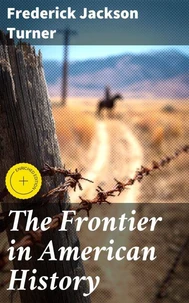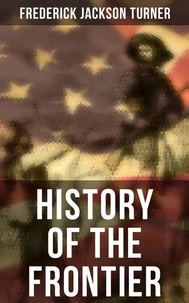The Frontier in American History
Par :Formats :
Disponible dans votre compte client Decitre ou Furet du Nord dès validation de votre commande. Le format ePub est :
- Compatible avec une lecture sur My Vivlio (smartphone, tablette, ordinateur)
- Compatible avec une lecture sur liseuses Vivlio
- Pour les liseuses autres que Vivlio, vous devez utiliser le logiciel Adobe Digital Edition. Non compatible avec la lecture sur les liseuses Kindle, Remarkable et Sony
 , qui est-ce ?
, qui est-ce ?Notre partenaire de plateforme de lecture numérique où vous retrouverez l'ensemble de vos ebooks gratuitement
Pour en savoir plus sur nos ebooks, consultez notre aide en ligne ici
- Nombre de pages273
- FormatePub
- ISBN859-65--4700466-0
- EAN8596547004660
- Date de parution17/05/2022
- Protection num.Digital Watermarking
- Taille547 Ko
- Infos supplémentairesepub
- ÉditeurDIGICAT
Résumé
In "The Frontier in American History, " Frederick Jackson Turner presents a seminal examination of the role that the American frontier played in shaping the national character and democracy. Through a blend of historical analysis and sociological inquiry, Turner posits that the unique experience of westward expansion fostered a spirit of individualism, egalitarianism, and innovation that fundamentally defined American identity.
The work, steeped in the context of the late 19th century, engagingly addresses themes of American exceptionalism while invoking the tension between civilization and wilderness in a rapidly changing society. Frederick Jackson Turner, a prominent historian, crafted this influential essay as part of his Ph. D. dissertation in 1893, coinciding with the official closing of the American frontier as declared by the Census Bureau.
His upbringing in the Midwest, exposed to the realities of frontier life, informed his reflections on how this geographic expanse served not just as a backdrop but as an active agent in shaping American society and culture. This book is a must-read for anyone interested in understanding the complexities of American identity and the historical significance of the frontier. Turner's insights remain relevant as they challenge readers to consider how geography influences social development and national consciousness, making it an enduring and thought-provoking work.
The work, steeped in the context of the late 19th century, engagingly addresses themes of American exceptionalism while invoking the tension between civilization and wilderness in a rapidly changing society. Frederick Jackson Turner, a prominent historian, crafted this influential essay as part of his Ph. D. dissertation in 1893, coinciding with the official closing of the American frontier as declared by the Census Bureau.
His upbringing in the Midwest, exposed to the realities of frontier life, informed his reflections on how this geographic expanse served not just as a backdrop but as an active agent in shaping American society and culture. This book is a must-read for anyone interested in understanding the complexities of American identity and the historical significance of the frontier. Turner's insights remain relevant as they challenge readers to consider how geography influences social development and national consciousness, making it an enduring and thought-provoking work.
In "The Frontier in American History, " Frederick Jackson Turner presents a seminal examination of the role that the American frontier played in shaping the national character and democracy. Through a blend of historical analysis and sociological inquiry, Turner posits that the unique experience of westward expansion fostered a spirit of individualism, egalitarianism, and innovation that fundamentally defined American identity.
The work, steeped in the context of the late 19th century, engagingly addresses themes of American exceptionalism while invoking the tension between civilization and wilderness in a rapidly changing society. Frederick Jackson Turner, a prominent historian, crafted this influential essay as part of his Ph. D. dissertation in 1893, coinciding with the official closing of the American frontier as declared by the Census Bureau.
His upbringing in the Midwest, exposed to the realities of frontier life, informed his reflections on how this geographic expanse served not just as a backdrop but as an active agent in shaping American society and culture. This book is a must-read for anyone interested in understanding the complexities of American identity and the historical significance of the frontier. Turner's insights remain relevant as they challenge readers to consider how geography influences social development and national consciousness, making it an enduring and thought-provoking work.
The work, steeped in the context of the late 19th century, engagingly addresses themes of American exceptionalism while invoking the tension between civilization and wilderness in a rapidly changing society. Frederick Jackson Turner, a prominent historian, crafted this influential essay as part of his Ph. D. dissertation in 1893, coinciding with the official closing of the American frontier as declared by the Census Bureau.
His upbringing in the Midwest, exposed to the realities of frontier life, informed his reflections on how this geographic expanse served not just as a backdrop but as an active agent in shaping American society and culture. This book is a must-read for anyone interested in understanding the complexities of American identity and the historical significance of the frontier. Turner's insights remain relevant as they challenge readers to consider how geography influences social development and national consciousness, making it an enduring and thought-provoking work.





